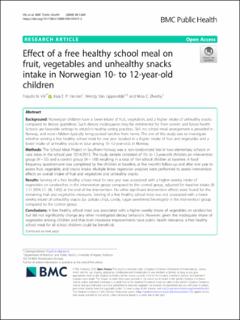| dc.contributor.author | Vik, Frøydis Nordgård | |
| dc.contributor.author | Heslien, Kaia Elisabeth Paulsen | |
| dc.contributor.author | Van Lippevelde, Wendy | |
| dc.contributor.author | Øverby, Nina Cecilie | |
| dc.date.accessioned | 2023-06-01T12:09:24Z | |
| dc.date.available | 2023-06-01T12:09:24Z | |
| dc.date.created | 2020-09-10T11:03:41Z | |
| dc.date.issued | 2020 | |
| dc.identifier.citation | Vik, F. N., Heslien, K. E. P., Van Lippevelde, W. & Øverby, N. C. (2020). Effect of a free healthy school meal on fruit, vegetables and unhealthy snacks intake in Norwegian 10- to 12-year-old children. BMC Public Health, 20, 1-8. doi: | en_US |
| dc.identifier.issn | 1471-2458 | |
| dc.identifier.uri | https://hdl.handle.net/11250/3069652 | |
| dc.description.abstract | Background: Norwegian children have a lower intake of fruit, vegetables, and a higher intake of unhealthy snacks compared to dietary guidelines. Such dietary inadequacies may be detrimental for their current and future health. Schools are favorable settings to establish healthy eating practices. Still, no school meal arrangement is provided in Norway, and most children typically bring packed lunches from home. The aim of this study was to investigate whether serving a free healthy school meal for one year resulted in a higher intake of fruit and vegetables and a lower intake of unhealthy snacks in total among 10–12-year-olds in Norway.
Methods: The School Meal Project in Southern Norway was a non-randomized trial in two elementary schools in rural areas in the school year 2014/2015. The study sample consisted of 10- to 12-year-old children; an intervention group (N = 55) and a control group (N = 109) resulting in a total of 164 school children at baseline. A food frequency questionnaire was completed by the children at baseline, at five months follow-up and after one year to assess fruit, vegetable, and snacks intake. Multiple linear regression analyses were performed to assess intervention effects on overall intake of fruit and vegetables and unhealthy snacks.
Results: Serving of a free healthy school meal for one year was associated with a higher weekly intake of
vegetables on sandwiches in the intervention group compared to the control group, adjusted for baseline intake (B: 1.11 (95% CI: .38, 1.85)) at the end of the intervention. No other significant intervention effects were found for the remaining fruit and vegetables measures. Serving of a free healthy school meal was not associated with a lower weekly intake of unhealthy snacks (i.e. potato chips, candy, sugar sweetened beverages) in the intervention group compared to the control group.
Conclusions: A free healthy school meal was associated with a higher weekly intake of vegetables on sandwiches but did not significantly change any other investigated dietary behaviors. However, given the inadequate intake of vegetables among children and that even moderate improvements have public health relevance, a free healthy school meal for all school children could be beneficial. | en_US |
| dc.language.iso | eng | en_US |
| dc.publisher | BioMed Central (BMC) | en_US |
| dc.relation.uri | https://bmcpublichealth.biomedcentral.com/articles/10.1186/s12889-020-09470-2 | |
| dc.rights | Navngivelse 4.0 Internasjonal | * |
| dc.rights.uri | http://creativecommons.org/licenses/by/4.0/deed.no | * |
| dc.title | Effect of a free healthy school meal on fruit, vegetables and unhealthy snacks intake in Norwegian 10- to 12-year-old children | en_US |
| dc.type | Peer reviewed | en_US |
| dc.type | Journal article | en_US |
| dc.description.version | publishedVersion | en_US |
| dc.rights.holder | © 2020 The Author(s) | en_US |
| dc.subject.nsi | VDP::Medisinske Fag: 700 | en_US |
| dc.source.pagenumber | 8 | en_US |
| dc.source.volume | 20 | en_US |
| dc.source.journal | BMC Public Health | en_US |
| dc.identifier.doi | 10.1186/s12889-020-09470-2 | |
| dc.identifier.cristin | 1828662 | |
| dc.relation.project | Universitetet i Agder: 689019 | en_US |
| dc.source.articlenumber | 1369 | en_US |
| cristin.qualitycode | 1 | |

